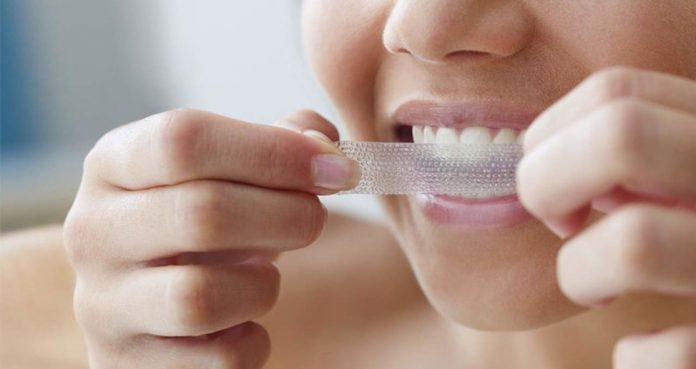Americans spend more than $1.4 billion alone on OTC teeth-whiteners and it is expected to become a $7.5 billion industry by 2024. People often use teeth-whiteners to get rid of the stains caused by smoking, drinking coffee or red wine, and natural aging.
However, according to preliminary research presented this week at the American Society for Biochemistry and Molecular Biology conference, these whitening strips could damage teeth beneath the surface.
Kelly Keenan, the lead study author and an associate professor of chemistry at Stockton University, treated extracted human teeth with whitening strips by following the manufacturer directions to leave them on for one hour. The author and his team also immersed the teeth in artificial saliva and washed them. Then they tracked the level of collagen and other proteins in the dentin layer of the whitened teeth.
The researchers found that the teeth treated with whitening strips, which once had less collagen and other proteins than the untreated teeth, had their proteins converted into smaller fragments and had smaller amounts of collagen.
Keenan said, “Our results show that treatment with hydrogen peroxide concentrations similar to those found in whitening strips is enough to make the original collagen protein disappear.”
“Tooth whitening is the most commonly requested service in many dental offices around the country… and we’re confident in saying that these products are safe and effective for all of the tissues of the tooth,” said Dr. Edmond Hewlett, a spokesman for the American Dental Association.
However, science shows that the teeth-whitening strips come with some side effects, such as mild gum irritation and increased tooth sensitivity, which may last for a few days and be quite painful, The side effects may aggravate if the whitening agent gets into a cavity or if you have gingivitis. Plus, overuse of such products can also damage teeth through demineralization and dehydration.
The dentists who spoke to MarketWatch recommended getting a professional whitening done to reduce the risks from wrong use.
“Whitening is best done under the supervision of your dentist. If you’re not supervised with the whitening strips, and you don’t place them properly, you can burn your gums or create white spots on your gums,” said one of the dentists.
Teeth-whitening products can take a toll on your wallet and they are not so effective for everybody. Plus, you will have to avoid stain-causing agents, such as coffee, red wine, smoking, etc., for at least two weeks after the treatment. The bottom line is teeth whitening strips could be safe, but you must talk to your dentist before using any such products. Your doctor dentist would determine whether you could be prone to gum sensitivity or painful tooth. And if you want to purchase whitening products, choose those with the seal of the American Dental Association acceptance, which means they have been evaluated by registered dentists on the panel.






















